TEO YOU YENN
She found her voice as a public sociologist when writing one of Singapore’s most influential books, but the years that followed its publication tested her resolve.
Every few years, I get the feeling that I ought to quit. Not just my job at the university, but the whole business of being a sociology professor.
There is much to enjoy. I especially like being in active data collection mode — meeting and talking to people outside my limited circles, getting a glimpse of how they live, trying to understand how patterns of social life form. There are also sparks of connection in classrooms, when students and I are joined by some exciting theoretical insight. And there is all the reading — I mean, who is so lucky to get paid to read?
At the same time, unease simmers. I get restless observing the gulf between non-academic writers writing big ideas that speak to what regular people care about, and academic articles splicing things into ever-smaller abstractions that Reviewers 1 and 2 care about. I watch the clock tick as I revise papers to please these reviewers, understanding better with each passing year that it matters little for the reading audience, assuming there is even one, but very much for my university, and therefore for my career.
It matters so much, indeed, that most days I forget that I am a member of a public university. I did my undergraduate and graduate training at a public university, and it means something to me to also work at one. At Berkeley I heard all the time that education and research of the highest quality ought to serve the public good and that a public university constitutes a special ethical community. But I rarely hear these ideals at my place of employment. And then there is me studying Singapore, a choice I made early on in my training because I hoped for a meaningful life where there is space for contribution, including from me. I am frustrated when I cannot find in-roads.
The first time I felt sucked toward the exit, I had barely made it past the entrance. After four years as a Sociology major, six years of graduate school, and two years of a post-doctoral fellowship, I landed a tenure-track job. Let me tell you, it is super scary to arrive at that point — a dream job for a young academic — and find out you hate it. It’s like you’ve saved up for a decade to buy your dream home, and the morning after moving in, you realize there are no windows. The sound of the (tenure) clock ticking was especially loud. It silenced everything else.
The game was clear: publish or perish. In fact, aim for only ‘high-impact’ journals, avoiding book chapters because those don’t count. Prioritize research and publications over teaching because no one has ever gotten tenure from good teaching alone. Say yes to ‘service’ things that count and ‘no’ to things that cannot go on your CV. Studying Singapore is risky — try not to be too critical of the government because you never know what could come back to bite you; and be careful who you associate with.
Years later, when I became Head of my department, I learnt that I was actually lucky, because the (il)logic of what counts for or against a person had not yet been so fully consolidated and institutionalized while I was working toward tenure. In more recent years, both the institution’s everyday practices and its leadership’s views of the world would lean more than ever toward this narrow view of academia.
The tenure-track game is alienating. I yearned for a home with lots of natural light and I got a box. I wanted to exchange ideas but found that the logic of the game creates inward focus — it makes more sense for everyone to keep heads down and do what needs to be done for and by themselves. After all, what awaits each one of us is either immense cruelty (‘here’s the exit’) or a jackpot with a lifetime payout. The stress made me grind my teeth at night and created a painful knot between my shoulder blades.
The problem with being a person who’s got it in her head that meaning matters, with being a human being that is, is that this was not enough. I don’t know how many of my peers dreamt of breaking free, but I would guess many shared my unease. No one chooses this path — staying a student well past the point of reasonable, putting life on hold while watching peers move forward, endless work and self-doubt both daily constants — simply to pursue ‘publications,’ ‘citation counts,’ and ‘teaching indices’ as if they are ends in themselves. There are many stories, I am sure, of how academics manage to stay the course while maintaining some semblance of meaning.
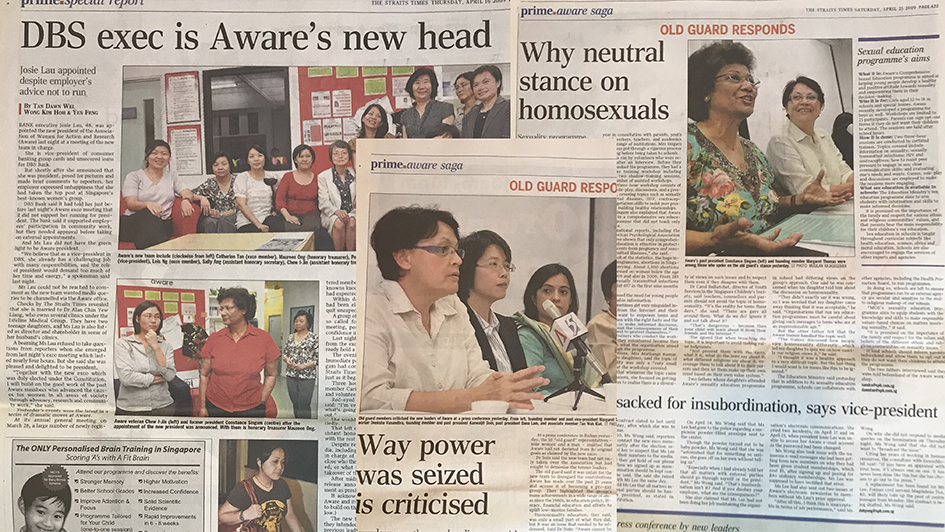
The 2009 coup at the feminist group Aware was a wake-up call for many in civil society.
My story involves Aware (the Association of Women for Action and Research), Berkeley’s approach to sociology, and my mentor Raka Ray.
I became a member of Aware soon after I returned to Singapore from Berkeley in 2003. I was still a graduate student, but had come back to do my PhD fieldwork. My time in Berkeley had given me language to think of myself as a feminist, and I needed an organization to make it legit. My PhD dissertation was on family policies in Singapore and how they produced certain state-society relations. Aware had formed in 1985 in reaction to the Singapore government’s eugenics-influenced pronatalist policies, and advocated around gender inequality in that intertwined private-public sphere of family. There was overlap in our interests and worldviews both in the abstract and concretely. I volunteered to help with one research project but was not otherwise active. I finished up my dissertation and then joined the Asia Research Institute as a postdoctoral fellow.
Then in 2009, the Aware Saga happened. Like many others who saw the existence of Aware in new, more urgent light, I stepped up my involvement. Having just had a baby daughter, navigating work and care, feminist issues were especially salient at a personal level. I joined the Board in 2010 and stayed for three terms until 2016. Those were years of rebuilding and regrouping, with deliberate reflection on the past and dreaming of the future, and constant discussions, implementations, trials and errors. Being a part of that labor, and the community around it, saved me from quitting my job. I got to be around many fearless women who worked tirelessly outside the boundaries of what counted in evaluation schemas. I was exposed to a range of registers and vocabularies, as people of different ages, from varying occupations or disciplines, interacted, fought, communicated. Hierarchy, not speaking out of turn, avoiding disagreement — these rules and norms that undergird my life in Singapore — went into suspension at 5 Dover Crescent. And I found a way to be useful to a cause larger than my CV, using my scholarship to write op-eds for Aware, activating knowledge about society and politics to partake in conversations about power, resistance, change. I saw that being an Assistant Professor was an asset; the title eased access to The Straits Times or Today. In Aware, I found a place for my needs and aspirations to breathe. Now, if I still had no reason to stay in the academy, I had reasons not to quit.
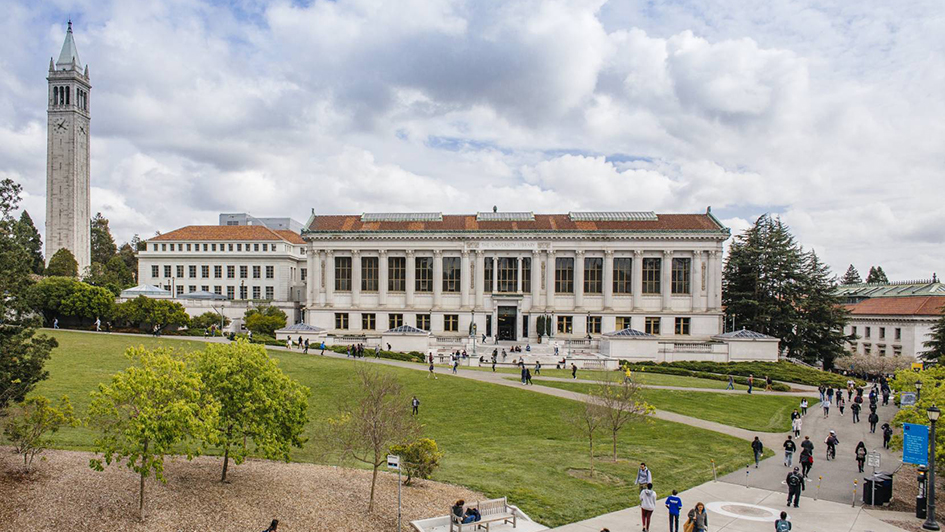
University of California, Berkeley.
Another thread goes back a little further. Many social scientists go into the profession because they hope to contribute to (positive) social change. Yet, there is contention about the appropriateness of being too enmeshed in the societies we study. We worry about losing objectivity when we take on normative positions as advocates. There are divides and disagreements between sociologists who focus on contributions within the scholarly community and those who move toward a more general public.[1] I had learnt to be a sociologist at Berkeley, where this tension frequently resolved toward ‘public sociology’ — exploring issues that a broad public cares about, favoring methodological approaches centering ordinary people’s voices and experiences, and generating knowledge accessible to the general public.
I have spent most of my years as a professional sociologist trying to be worthy of my Berkeley training. It is a little pathetic, but also helpful. Reading and observing the work of my teachers and grad school peers, I’ve learned that it is possible, desirable, required, that sociologists produce scholarship that is at once accessible and rigorous, pragmatic and deep. It is necessary to speak to problems that matter to people, and to participate in the societies we study, but also to develop skills and capacities for stepping back so that we can see and think clearly about those societies. For me, contribution toward societal change through engagement with the community is part of the package of being a sociologist.
When my Berkeley worldview came together with my Aware life, it became clear to me that if I wanted to be useful, I had to get good at doing sociology. The title of Assistant Professor may open doors, but I needed actual expertise to cross the threshold. In those years, I gradually saw this as my task: to become a sociologist (which is not the same as becoming someone with a degree in Sociology or having a job as sociology professor).
And there is a third thread that, in this retrospective at least, ties it all together.
My advisor, Raka Ray, came to visit in 2010. We spent some pleasant days together. She gave a public lecture at the national library. Over meals, I introduced her to colleagues and friends. She wanted to know, always wants to know about her students, how I was doing, what my life has been like. A few hours before she was scheduled to leave, I drove her to the airport and we had dim sum at Crystal Jade. I can’t remember exactly when big, hot tears started falling onto my plate, but one minute I was telling her about the essays I had started writing for myself and the next it was like I was back on the ‘crying chair’ in her Barrows Hall office. The essays I was talking about were aimless, on everything and nothing, and I hoped they would help me build skills for when I quit the university. This is how clueless I was: I thought being an actual writer was a viable backup after I’d failed as an academic writer.
But did Raka tell me how ridiculous I was? In Raka style, she was nonplussed and firm; she’d seen a lot of students through existential crises and crying fits. She said simply: “Youyenn, you’re finding your voice.” And then she told me that I was doing exactly what I should be doing. I should stay in my job, get tenure, then leave if I still wanted to. It would take me several more years, when I wrote This is What Inequality Looks Like, to locate that voice. Raka gave me the permission I needed then, as a young person, to separate career from vocation, my job from my dreams. She pointed me to a space where a window could be made and handed me a hammer.
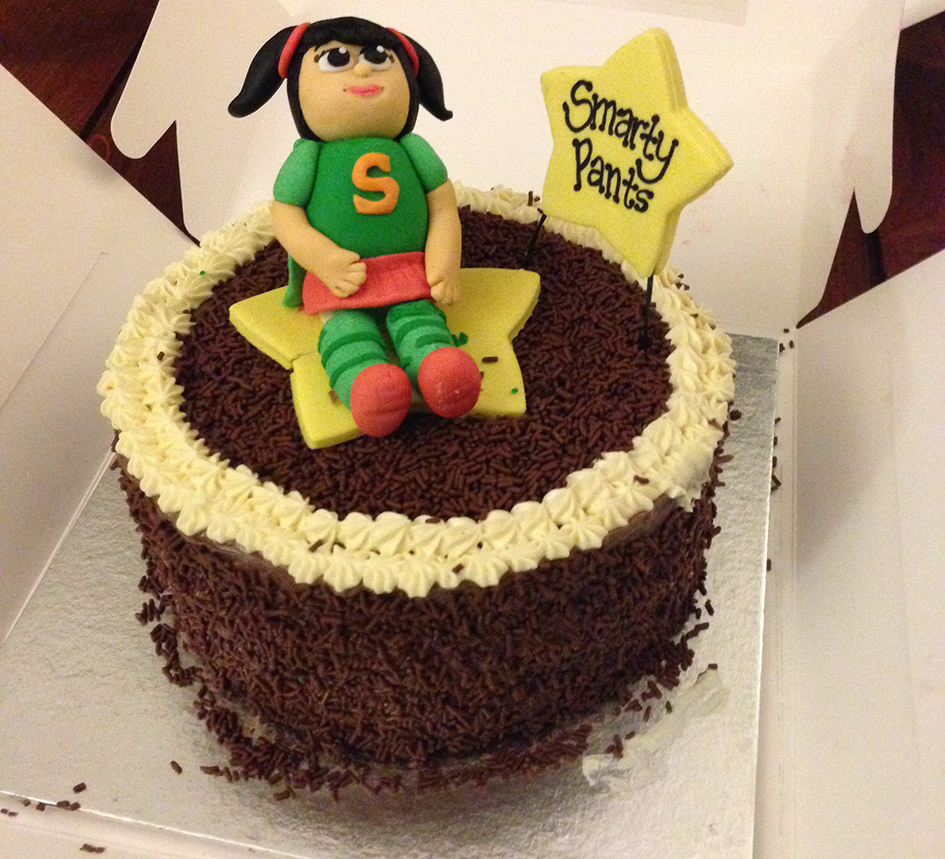
Cake to celebrate tenure, circa 2014.
In 2014, when I was promoted and tenured to Associate Professor, my Aware friends threw a party in honor of ‘OTO’ (oh tenured one). They got me a cake, made me wear a bunch of different head gear, and had a poster made with my face on it that I cannot show here (did I mention feminists are a funny and fun bunch?). More years later, in 2018, when I sent Raka my book, she wrote back: “You did it, dear Youyenn! You found your voice, and what a voice it is! .…I am blown away, pleased, proud, and in tears.” I have to admit I wanted to gloat to Raka’s other students that I had made her cry. Michael Burawoy, my undergraduate theory professor and a legend at Berkeley and beyond for elevating the status of public sociology in the US, wrote a blurb for my book that called it: “Sociology at its best!” I just about fell out of my chair when I got that email; at last, I am worthy.
*
Although I had built a separate lifeworld outside of the university, one that mattered deeply to me and which I spent considerable energy on, I was still focusing most of my attention on doing what was required to make tenure. Pursuing research in a particular form, writing in a certain style, publishing in limited outlets, prioritizing some activities over others. I had been calculative about my commitments and I was careful to be as polite as I was critical when I wrote about policy.
If you do something enough, you start integrating its inevitability into your body and mind. The years on the tenure track created a kind of strategic calculus for engaging with the world. If you had asked me then, I probably would have denied it, but I had acquiesced if not embraced: that the university’s criteria reward good scholarship; that the prioritization of research over teaching is natural; that the successful application of grants indicates merit; and that erring on the side of careful when critiquing the government is rational. That moment of promotion is one of particular delusions: I made it, so I must deserve it; my way must be the right one. While I often explicitly thought that tenure is a means to other ends, after I was promoted and tenured, I was unclear for which ends I would use these means. How would I be able to do things differently after years of marching to a certain beat?
“Now that I have tenure” — what is the rest of that sentence?
So, in fact, after the OTO party and before those frame-worthy emails, I again felt the tremor of a fault line. I had pursued dual lives quite satisfactorily, but had I found my voice? I wondered if it was time to act on the second part of Raka’s advice about leaving the university after tenure. If not, how should I confront, again but anew, the uneasy relationship between the ideals about scholarship I harbored and the realities of my job?
I was at a different point in the research cycle this time. In 2010, I was mostly writing my first book, Neoliberal Morality in Singapore: How family policies make state and society. Between 2013 and 2016, I was in the thick of fieldwork, studying poverty in Singapore.
How we spend our days — the spaces we move through, what we see and who we meet, the languages and modes of exchange we embody, what amuses or troubles us — draw out different parts of our selves. When I am writing intensely, I am immersed in abstractions — words, paragraphs, structures, frames. The logic and aesthetics of theory building consume my attention and take on a realness that is probably hard for non-writers to relate to. The writing is my world; I live and breathe in it. But when I am doing fieldwork, other things come to the forefront: I expend effort speaking and holding my body in appropriate ways to enable connection; the strangeness of other people’s lives engages my attention and demands my response. I puzzle over how empirical observations mesh or clash with the analytic goals of my project. There are jarring contrasts: between what I think I know and what I see, between how others are and how I am. In my research site, because I witnessed a great deal of injustice and hardship, I had to consider over and over, what I was doing there and if it was right.
To write, a robust ego and solid self are key. There has to be some belief in the singularity of one’s ideas. When I am writing, I dig deep for confidence, mine for delusions of grandeur. Sometimes the only way to sustain the illusion is to hunch inward, with one’s back to the world. But to study people and society, to try to comprehend how others experience and make sense of the world, a different temperament is necessary. To do the work, a sociologist cannot be the star of the show; one has to suspend and soften the borders of oneself. Other qualities are needed: empathy, attentiveness, readiness for human connection, and a tolerance for ambiguity and paradox.
I was lucky to be in this stage of research in the years immediately following tenure. Deep in fieldwork, I was in one of my soft-shell phases. The project was a departure from earlier work: there was more at stake if things didn’t change. I could and did frequently think about what kind of sociology I was doing, what opportunities I had, and especially urgently, what responsibilities should follow.
It may sound like this is all solitary labor, but I was not alone. If I introduced all the individuals who helped me draw a different arc, whose actions and counsel inspired me, this essay would become extremely rowdy. So I’ll just say that it happened with a lot of help and more goodwill than I deserve. I’ll say another thing: the moment I received tenure, I became someone with a lot to lose. I avoided getting sucked into that vortex, thanks to all the people who held me: people who understood the game but rejected its claims; people out of the game who could clarify its irrationalities; and people who inhabited such separate worlds that they could freely express how they saw my work and what they thought I should do with it.
What does it mean to find one’s voice as a sociologist? In these years I saw that my task is not just about learning to write better or with less jargon. A writing voice is not merely a matter of style but an issue of purpose. The kind of sociologist I want to be pursues work that matters to society; takes seriously the experiences and perspectives of ordinary people; makes effort to capture the complexities of human lives; places power and inequality at the core of research questions and analysis; and tries to contribute to positive social change.
Cultivating a voice requires taking all those commitments to the process of building new analytical frames and lenses — because that is what sociology can do — and then bringing those frames and lenses to people who can, collectively, use them to imagine and build a better world. Linda Lim, who later became a fellow founding editor of AcademiaSG, reminded me several times that none of us can nor need to do everything. We should try to figure out what we can contribute that others cannot. After tenure, I became more focused in my search for what sociology could do and what I, still dreaming of becoming a sociologist, was particularly well placed for.

The sort of thing her editors at Ethos Books sent her to keep her going.
2017 was my happiest year of writing. Once I scrapped the academic book for a book of essays for a non-academic public, a freedom I did not know before came into existence. In this new space, the more I wrote, the more the purpose of working clarified itself.
*
For several years after the publication of This Is What Inequality Looks Like (TIWILL) in 2018, my work and sense of purpose destabilized. This was unexpected and disconcerting. Even in this essay, you can probably see that I had built a narrative arc for myself: the story is about the preparations I did to get to this point, the benefactors who paved the way, and the culmination of a journey in public sociology that ends on the high of a bestselling book.[2]
Yet this is not a story of arrival or triumph; the arc refuses to stay put. After it was out in the world, TIWILL demanded of me skills I did not have and tasks I didn’t enjoy. The habits, temperaments, and capacities necessary for academic work are different from, and sometimes in direct tension with, those needed for public engagement.
First lesson: after a book is released, it can take on a life of its own, interpreted in multiple ways, used to serve various people for different purposes. Writers of fiction or popular nonfiction understand this well, but academics do not really have to. Most academic writing is not widely read and used. The goals of an academic paper or a book, contained as they are in the writing, usually remain within those narrow parameters after publication. They do not get altered much while in use by others; if they do travel, it is slowly and subtly. Most academics forget about most of their writings once they are published; after my first book was published, I didn’t read it again for several years.
I expended huge energy to write TIWILL and was just about to sit back and relax when I found myself chasing it down various alleys. The book received a lot of attention immediately after its publication. It was mentioned in parliament. Readers posted about it on social media; some artists among them made things—poetry, songs, cartoons. Journalists and academics wrote about it in magazines and newspapers; readers posted reviews on Goodreads, Facebook, Instagram. I followed mentions of the book, and the ensuing conversations about poverty and inequality, closely.
TIWILL contains specific positions on a particular set of issues: that we cannot think of the problem of poverty as separate from the phenomenon of inequality; that structural and policy, not ‘mindset,’ change is what we need; that it is difficult to properly debate social problems and generate creative solutions when there are major restrictions on free expression and collective resistance.
As the book moved through different hands, sometimes through groups with vested interests to misread/lead, these points were diluted and occasionally contorted. I had worked hard on the placement of every single word in that book and these key points were not peripheral. I felt that if they were misunderstood, then my work would have been in vain. So I kept going: for about two years, I followed up with public talks, wrote commentaries, took meetings, replied to emails. I was weary and wanted badly to go back to the regular programming of an academic, but that path, at least for a time, was closed. I gave it my best shot, and then the pandemic hit, and of course many of our lives, the ways we think about life itself, shifted in significant ways. I saw that there were limits to what I could do, and limitations of knowledge I had to accept and maybe even try to embrace. After a time, goals and intentions become messy and divergent. Other people’s perspectives and voices, transcending my one-person imagination, get louder. The book compelled me to step forward into the public space, more than I wanted to with my academic’s temperament; and then it compelled me to accept that not only will I not win the argument, but I will also lose control over my own claims, an even bigger challenge to my sensibility as a scholar.
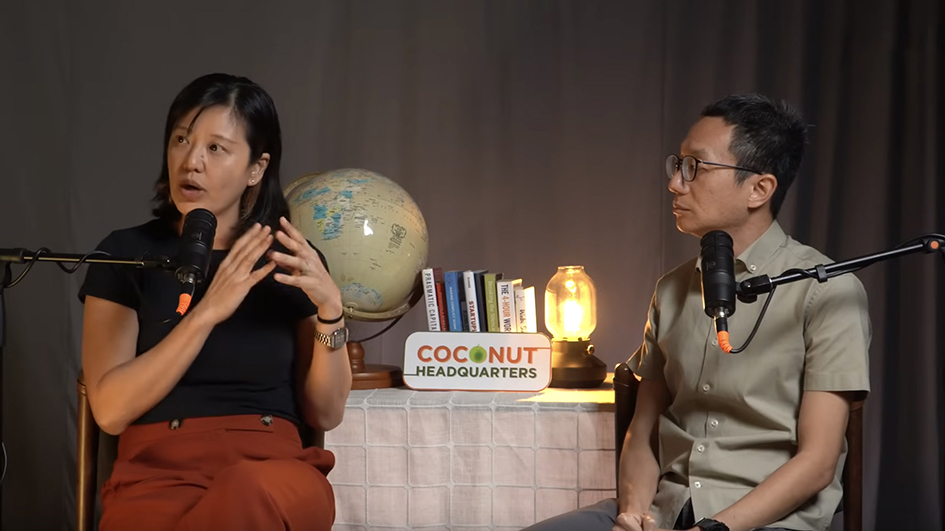
With Ng Kok Hoe, talking about their Minimum Income Standard study on The Financial Coconut podcast in 2024.
A second lesson helped ease the first: public sociology (or social science) is not the work of an individual. Academic work in the humanities and social sciences is often solitary, or at least individual-centric. When we have collaborators, it is typically a small group of other academics, often with many overlapping or complementary research interests and methodological approaches. TIWILL was different.
A few illustrative examples from different times in the process: while doing the research, I was regularly talking to people who work in non-profit organizations in low-income neighborhoods in addition to people living in low-income households. Many of these conversations were about how to think about social change and how improvements to people’s lives and conditions can come about. They broadened my perspectives and deepened my understanding of context and, importantly, helped give shape to how a study such as mine might place within a broader community of changemakers. I entered the space with certain questions and goals, and these changed not only in the usual ways that research questions change — because ‘the data’ requires it — but also because I was in conversation with others, non-academics, who led me to see how I might shape the work to be part of a larger constellation of efforts and concerns.
After the book was published, it was widely read by people in the social service and nonprofit worlds, and the conversations extended and expanded, drawing in more people and groups than I could possibly have personally talked to. I think this was made possible because the concerns and interests of this broad community are represented in the book, and because the book fills some gaps in existing efforts. When I wrote earlier that public sociology needs to be attentive to issues that matter to people, this is one example. The work that I had to do after TIWILL was published was also supported by and often in collaboration with others concerned about poverty and inequality, and who were advocates in various ways. People and groups passed around my book, organized events and invited me to participate, and in both public and private, spoke in my defense when I was attacked.
I don’t know if this is obvious, so let me be explicit: it takes effort to reach and communicate with people outside of one’s usual circles. It takes time to build relationships and trust. When this is a priority—and I think it ought to be—other things must give way. The afternoons when I was sitting at a kopitiam chatting with people were afternoons when I was not writing journal articles. The weekends and evenings I attended meetings or spoke at events was time I was not spending with my family and friends.
These are not easy choices and are especially hard for junior scholars today. Even with greater seniority and job security, every appraisal season when I was Head of Sociology and evaluating colleagues using the university’s criteria for productivity, I became hyper-conscious of the cost of my choices and was involuntarily embarrassed. TIWILL has been read by more people than all my other writings combined; has been reviewed hundreds of times on Goodreads; will sell vastly more copies—more than 40,000 to date—than most academic books. But my ‘citation count’ is modest and when I ask senior colleagues about my prospects for promotion to full professor, I am advised to write my real second book.
Still, I want to sell public sociology/social science: it is remarkable and thrilling to meet people who care about similar issues, it is deeply meaningful and a great privilege to have opportunities to contribute to things larger than oneself. But eyes wide open. I’ll end with a third point. It will sound at first like a cautionary tale, but I hope it will turn into a reminder that limitations are always accompanied by possibilities. If the problems of inequality and injustice are real, then it follows that one must expect the work of addressing them to be difficult as well as continuous.
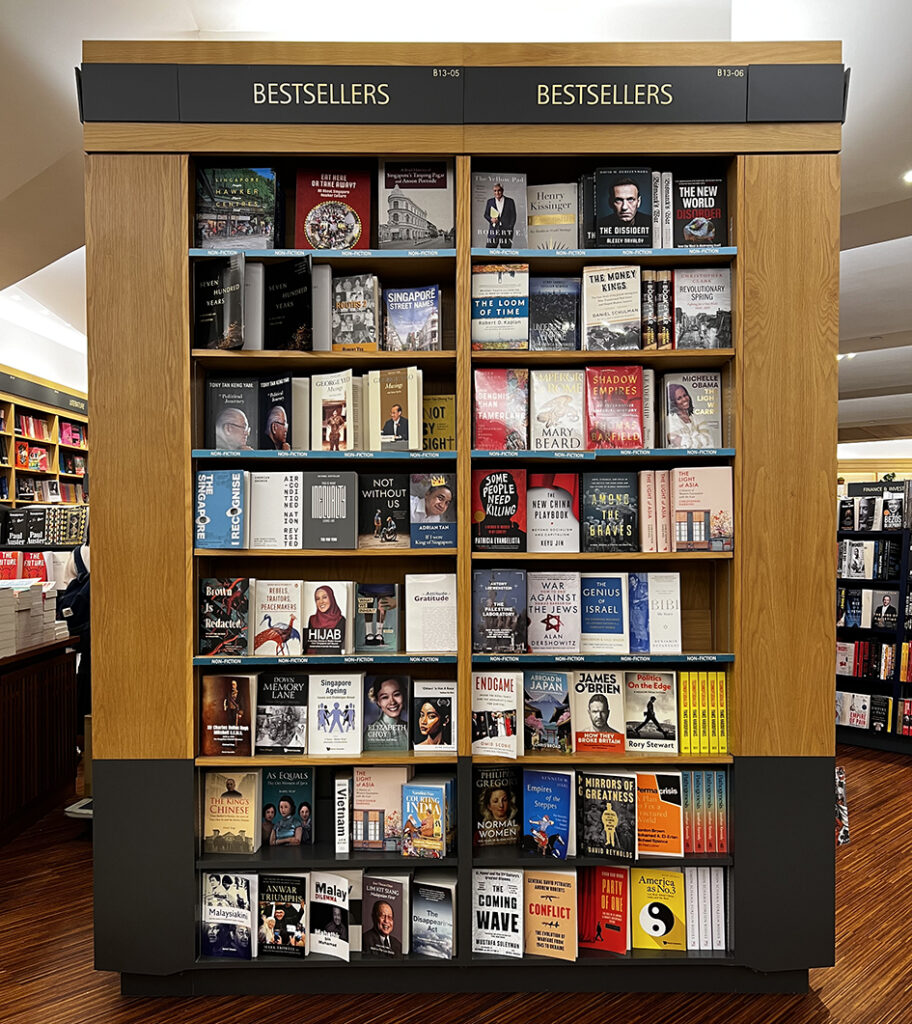
“I will never tire of seeing this, thank you Kinokuniya.”
Any person you stop on the street (really, go ahead, try it) can tell you that the PAP government is the most powerful force in Singapore today, and for as long as they can remember. Academics have our specific experiences of this. We whisper and text when government funding agencies tell our colleagues to change their presentations or hold back their findings. We discuss if ‘higher-ups’ are the reason colleagues are advised to modify what they teach in class. We receive instructions or informal counsel about speakers we can and cannot invite to our universities. We witness academics turned quietly away from jobs they qualify for when they ‘don’t clear HR’; academics rubbished in the mainstream press when they clash with political elites; and academics who have their work permits or permanent residencies revoked when they engage in critical scholarship or activism. Then there is a carrot-side story: academics rewarded for uncritical work; academics elevated in national media for statements that resonate with official positions; and the growth of grant opportunities for the study of problems as defined and framed by government agencies.
My own experience is that there is also a difference between what happens front of house versus backstage. The civility and friendliness of the performance make you uncertain about what the encounters behind the scenes mean. It was difficult to interpret what was happening and if I was —as many people asked me — “in trouble with the government”. The treatment of TIWILL over time helps to illustrate this sense of ambivalence and ambiguity.
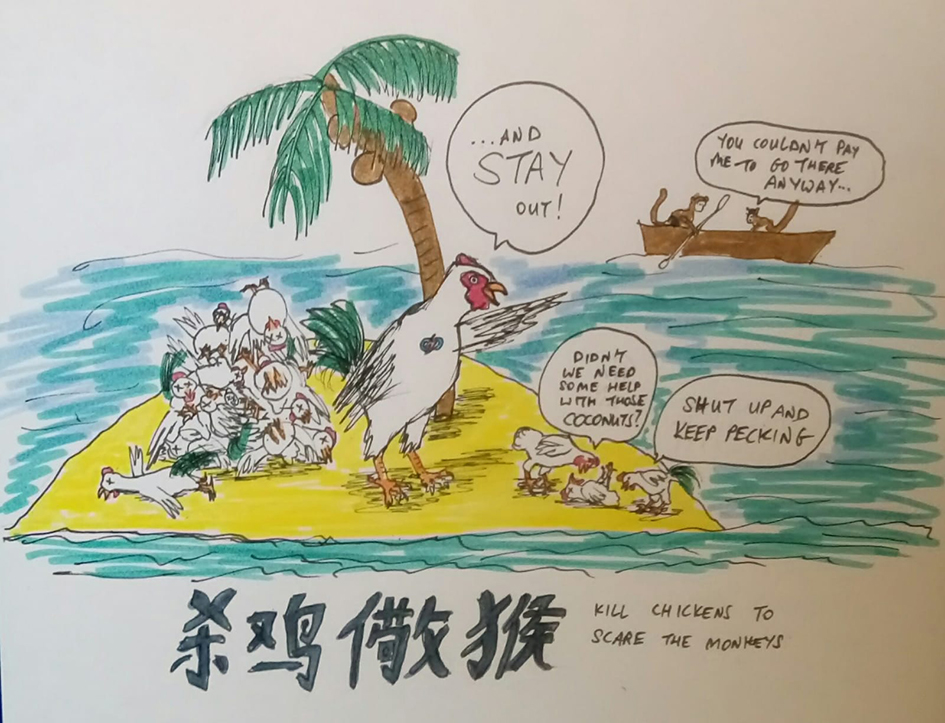
“I often ask my talented friend and collaborator, Jolene Tan, to make me pictures.”
For the first few months after TIWILL’s publication, it got a lot of coverage in the mainstream press. Thanks to ‘NTU in the news’ — a daily digest the university sends out to faculty — I know my name was in the news a lot. I placed several op-eds in The Straits Times and reporters contacted me often for comment on stories relating to inequality. There was even a full-page feature, an excerpt from my book.
Then, the tone shifted. I heard rumors that the press had been asked why they were still publishing my work. Soon after, two high-profile commentaries— one by a senior social worker and another by a minister — criticized my work. A friend told me they too had been asked by the ministry to write something to “counter” me (they declined). A minister shared these commentaries on his Facebook page and commented that people should listen to people doing real work on the ground, instead of “bleeding heart” academics. Reporters stopped asking me for comments, and I did not publish another op-ed in the mainstream press for some time. In the middle of the year, a minister was keynote speaker at the convocation of my school. When we met in the dressing room, he made a big show of friendliness, got his staffer to bring him his copy of TIWILL so that I could autograph it. On stage, I was seated next to him, and his speech was not about what graduates should aspire to, but about how much the government is doing to uplift the lower income.
Then came a more direct official response to TIWILL. Two senior civil servants (and a more junior one) arranged a meeting to discuss my research. In addition to giving me a 20-slide presentation about government assistance, they delivered, in a large envelope, a letter detailing what they called ‘factual errors’ that they wanted me to ‘correct’ in my book. When I had not done so a few weeks later, they contacted me again on email, asking for my phone number as well as that I make the changes immediately, place them online and put a sticker on my book to direct readers to this ‘errata’. Several friends and colleagues helped me review their claims and demands closely. I declined their request: differences in interpretation and analysis — my entire job as a sociologist — is not the same as ‘factual errors’. Not long after, the ministry, with the help of another academic, published a book that makes exactly the points they made in their letter; oddly, TIWILL is never cited nor referenced. A few months later, I had the chance to see their main objections more clearly: that I/we academics do not give enough credit to government schemes and that we do not accept ‘family as first line of support’ and ‘many helping hands’ as unassailable principles of a welfare regime. I get this opportunity because another letter was delivered, this time through a funder, to the Minimum Income Standard (MIS) team of which I was a part, ahead of the launch of our report. We had presented it to representatives from ministries and government agencies at a closed-door meeting. Following this preview, they wanted us to make changes before going public. The funder told us we had to do it, or they would pull their support for the launch. We declined and ended up releasing our work independently.[3]
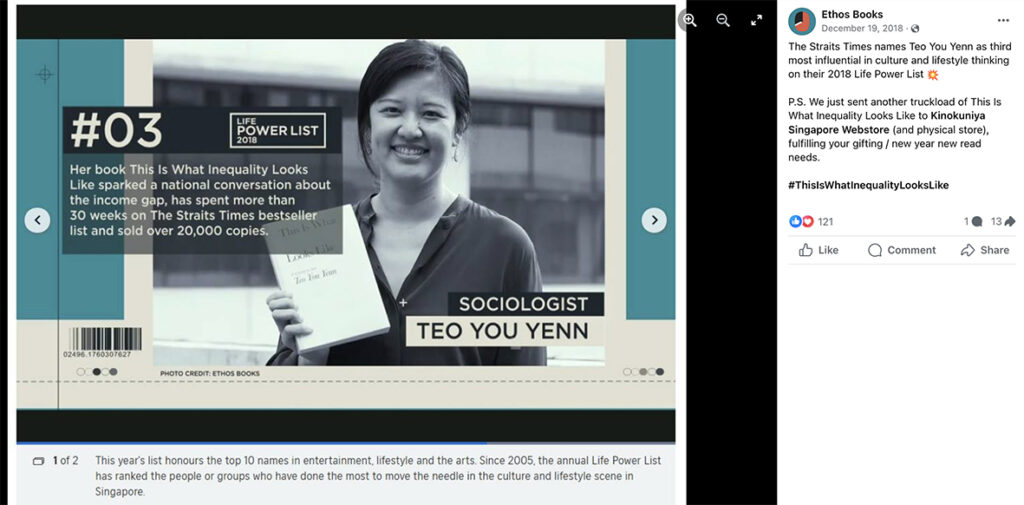
Teo You Yenn on the Straits Times Power List 2018.
At the same time as these things were happening behind the scenes, in public, I was still occasionally feted. The Straits Times put me on their year-end ‘Power List’ and then nominated me for the ST Singaporean of the Year award. This earned me and three guests a visit to the Istana to meet the President; we were driven there, like other nominees, in a Maserati. When the editor-in-chief shook my hand on stage, he told me he wished the Straits Times Press had been the ones to publish my book.
*
After This Is What Inequality Looks Like was published, I learn that the Singapore state has many different levers and modes through which to exercise its will. Doing public sociology in Singapore today therefore requires some tolerance for humiliation, a dose of humor, and friends who can regularly let the gas out of the tank.
But I also learn that it is possible to move through friction rather than avoid it, and we have tools of our own. The wisdom of our academic disciplines and scholarly crafts, built collectively and continually, over time and across place, are rich material that we can keep tapping on to guide our decisions. Our connections to and solidarity with others in society, if we cultivate them, translate into opportunities to be inspired and encouraged by good people, and to be reminded of the depth and weight of social problems. These connections can empower efforts to bring knowledge out of the ivory tower and into the world. Our self-knowledge and mutual recognition that we are making good-faith efforts to contribute to the larger good — and why should the powerful have monopoly over who is or isn’t engaging in good faith? — can fuel our purpose when actual progress is stymied. How have I stayed an academic? There is much that is haphazard and idiosyncratic in my personal story, but I believe these are tools that every scholar can — if they want to — access.
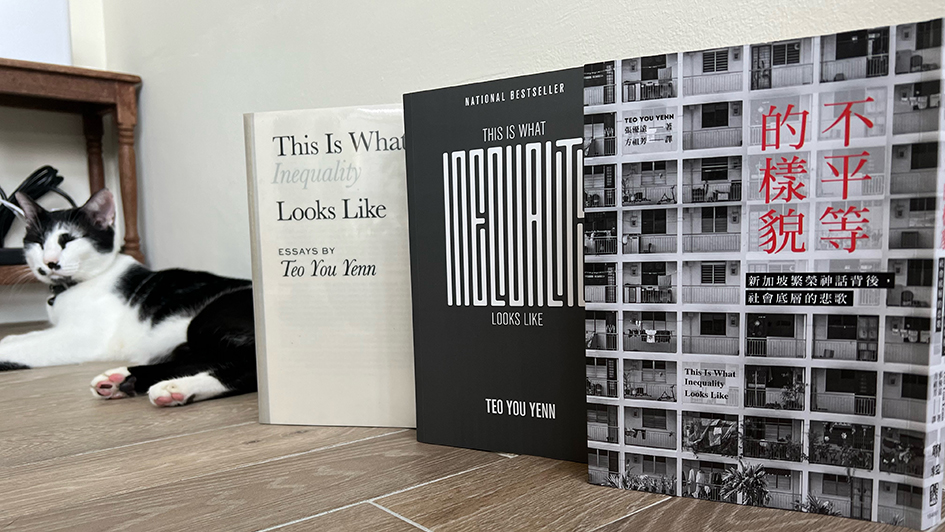
“‘The cat is unimpressed,’ an essay for another time.”
Let me end with a final pitch for doing public social science. The problems of the world are much larger than the travails of an academic; the contributions of any given scholar are, no matter how you cut it, small. But it is immensely important that accurate, rigorously produced knowledge about the world features in how solutions to problems are forged. In a world of immense inequality and rampant misinformation and misrepresentation, just doing our jobs in universities is not enough. While viewing our individual contributions lightly, we ought to take very seriously the potential value, and ethical obligations, of our collective enterprise. When we see and place ourselves within a community of knowledge producers, we can also overcome some of the alienation built into academia to forge a productive, and meaningful, scholarly life.
NOTES
[1] Many scholars have written about this. I describe some of these discussions, as well as how it maps onto the specific political context of Singapore in Teo, Youyenn. 2021. “From Public Sociology to Collective Knowledge-Production,” pp. 54-65 in The Routledge International Handbook of Public Sociology, edited by L. Hossfeld, E. B. Kelly and C. Hossfeld. London; New York: Routledge.
[2] TIWILL was on the Straits Times’ Non-fiction Bestseller list for 35 weeks.
[3] After this, we raised money from different funders to do a second round of MIS research. To date, we’ve published three public reports, and several commentaries and podcasts. See the MIS website.
